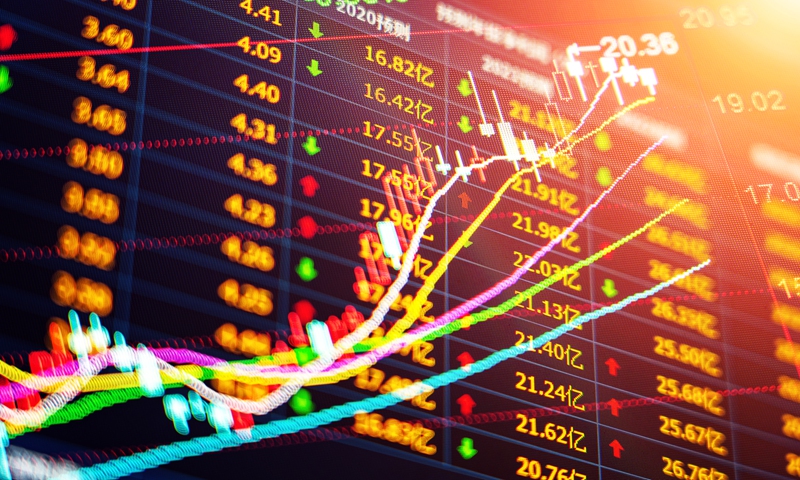The extended surge underscored a further uplift in investor confidence, which observers said was fueled by multiple policy roll-outs that simultaneously target a raft of malicious short selling conducts and prioritize protecting the interests of investors.
As the capital market’s downward momentum showed signs of reversing, it is expected that the recovery curve of Chinese stocks will focus on “repairing valuation” in the Year of the Dragon, analysts said, while warning against any anti-China forces that attempt to instigate market panic and stock selloff as part of a financial war against the world’s second-largest economy.
The benchmark Shanghai Composite index edged up 1.28 percent to close at 2865.90 points on Thursday. The Shenzhen Component Index soared 1.29 percent, while the ChiNext Index, China’s Nasdaq-style board consisting largely of technology enterprises, jumped 1.16 percent, rising for four consecutive days.
Over 4,800 individual stocks staged a rally, with over 1,000 hitting their daily upward limit of 10 percent or more on Thursday. Shares involving industrial machinery, leisure goods, environmental protection, fine mechanical engineering, as well as internet and semiconductor industries led the gain.
The net inflow of northbound capital, or overseas money flowing into the Chinese mainland’s A-share market through Stock Connect programs, also recorded net purchases for an eighth consecutive trading day.
Trading of multiple exchange traded funds (ETFs) that track smaller stocks have expanded significantly on Thursday, highlighting an across-the-board confidence rebound. The daily trading of Huatai-PineBridge Investments’ CSI 2000 ETF and Southern Asset Management’s CSI 2000 ETF hit 5.57 billion yuan and 1.064 billion yuan, respectively, both setting new highs.
“The performance of major stock indexes reflected that the oversold period has come to the end. With the value of most of the stocks underestimated, plus multiple economic figures are returning to normal, the capital market may extend the trend of growth in 2024 spring,” Hu Qimu, deputy secretary-general of the digital-real economies integration Forum 50, told the Global Times on Thursday.
The Chinese stock market is scheduled to be closed on Friday, and will reopen trading on February 19 after the eight-day Spring Festival holidays.
China’s central bank on Thursday has conducted 90 billion yuan of seven-day reverse repos at an interest rate of 1.8 percent, as part of move aiming to keep liquidity stable ahead of the Spring Festival. It also conducted 255 billion yuan of 14-day reverse repos at an interest rate of 1.95 percent.
The latest move adds to a number of policies the Chinese financial authorities have announced to shore up the market and crack down on illicit market manipulations.
“The sweeping, decisive steps have worked out to forestall investors’ sliding confidence before the Spring Festival and will lay foundation of a further climb-up after the holidays,” Hu said.
Marko Papic, partner and chief strategist at asset management company Clocktower Group, predicted that Chinese stocks will likely climb by at least 10 percent in coming days as authorities signal concerted support efforts, according to a CNBC report on Wednesday.
Yang Delong, chief economist at Shenzhen-based First Seafront Fund Management Co, told the Global Times on Thursday that as market risks are gradually put under control and as investment opportunities are abound, China’s stock market rebound in the Year of the Dragon could likely be characterized by “equities’ valuation repairing.”
Analysts projected that more follow-up policy supports will be announced after the holidays, in terms of how to improve the quality and valuation of listed companies, inject more liquidity into the market as well as eradicating market misconduct. Also, the effects of China’s proactive financial policy are poised to bear fruits later, which could also provide new impetus and instill new confidence to the recovery of the market, Hu added.
“The financial authorities will spare no effort to guard against short selling, some of which could have deployed all resources to amplify market pessimism sentiment with a malicious aim to break down China’s financial system,” Hu noted.
The China Securities Regulatory Commission (CSRC) announced on Tuesday that it will, in line with the law, suspend securities companies’ new business involving share lending for short selling.
On Wednesday, the first day of the implementation of the new policy, only five such transactions were completed, compared with over 6,000 daily trade last week, news website of the National Business Daily reported.




